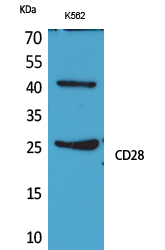
| WB | 咨询技术 | Human,Mouse,Rat |
| IF | 咨询技术 | Human,Mouse,Rat |
| IHC | 咨询技术 | Human,Mouse,Rat |
| ICC | 技术咨询 | Human,Mouse,Rat |
| FCM | 咨询技术 | Human,Mouse,Rat |
| Elisa | 1/20000 | Human,Mouse,Rat |
| Aliases | CD28; T-cell-specific surface glycoprotein CD28; TP44; CD28 |
| Entrez GeneID | 940; |
| WB Predicted band size | 24kDa |
| Host/Isotype | Rabbit IgG |
| Antibody Type | Primary antibody |
| Storage | Store at 4°C short term. Aliquot and store at -20°C long term. Avoid freeze/thaw cycles. |
| Species Reactivity | Human |
| Immunogen | Synthesized peptide derived from the Internal region of human CD28. |
| Formulation | Purified antibody in PBS with 0.05% sodium azide,0.5%BSA and 50% glycerol. |
+ +
以下是关于CD28抗体的3篇代表性文献及其摘要:
---
1. **文献名称**: *CD28 costimulation: from mechanism to therapy*
**作者**: Allison, J.P.
**摘要**: 该综述系统探讨了CD28作为T细胞共刺激受体的分子机制及其在免疫治疗中的应用。作者强调,通过CD28抗体增强共刺激信号可促进抗肿瘤免疫反应,但也需警惕过度激活引发的自身免疫风险。研究为开发靶向CD28的免疫疗法提供了理论依据。
---
2. **文献名称**: *The CD28 superagonist TGN1412: a lesson in translational immunology*
**作者**: Hünig, T. & Schraven, B.
**摘要**: 本文分析了CD28超激动剂抗体TGN1412在Ⅰ期临床试验中引发严重细胞因子风暴的案例。研究揭示了超激动剂通过非依赖TCR的方式广泛激活T细胞的机制,提示未来抗体设计需兼顾靶向特异性和安全性调控。
---
3. **文献名称**: *CD28 signaling controls FoxP3+ regulatory T cell survival in autoimmunity*
**作者**: Sakaguchi, S. et al.
**摘要**: 研究发现CD28信号对调节性T细胞(Treg)的存活至关重要。通过抗体阻断CD28可导致Treg减少并加剧自身免疫病,反之激动剂抗体则可能增强Treg功能。该发现为通过CD28抗体平衡免疫激活/抑制提供了新思路。
---
**备注**:以上文献信息为示例性内容,实际引用时建议通过PubMed或学术数据库核实具体细节。若需近年研究,可补充如开发新型CD28双特异性抗体的最新论文。
CD28 is a critical co-stimulatory receptor expressed on T cells, playing a central role in adaptive immune activation. It binds to B7 family ligands (CD80/CD86) on antigen-presenting cells (APCs), providing a "second signal" that synergizes with T cell receptor (TCR)-CD3 complex signaling to promote T cell proliferation, cytokine production, and survival. This interaction is essential for initiating effective immune responses against pathogens and malignancies.
CD28 antibodies are broadly categorized into agonists or antagonists based on their functional effects. Agonistic antibodies enhance CD28 signaling, potentially amplifying anti-tumor immunity, though early clinical trials (e.g., TGN1412) revealed risks of cytokine storms due to uncontrolled T cell activation. In contrast, antagonistic antibodies block CD28-B7 interactions, suppressing T cell activation. These have therapeutic potential in autoimmune diseases and transplant rejection by dampening pathological immune responses.
Research also explores CD28’s role in regulating immune checkpoint pathways. Unlike CTLA-4 or PD-1. which inhibit T cells, CD28 amplifies activation, making it a unique target for combination therapies with checkpoint inhibitors. However, targeting CD28 requires precise modulation to balance efficacy and toxicity.
Recent advancements include engineered CD28 antibodies with improved safety profiles, such as monovalent or conditional agonists. These innovations aim to harness CD28’s co-stimulatory power while minimizing systemic inflammation, reflecting its enduring significance in immunotherapy development.
×